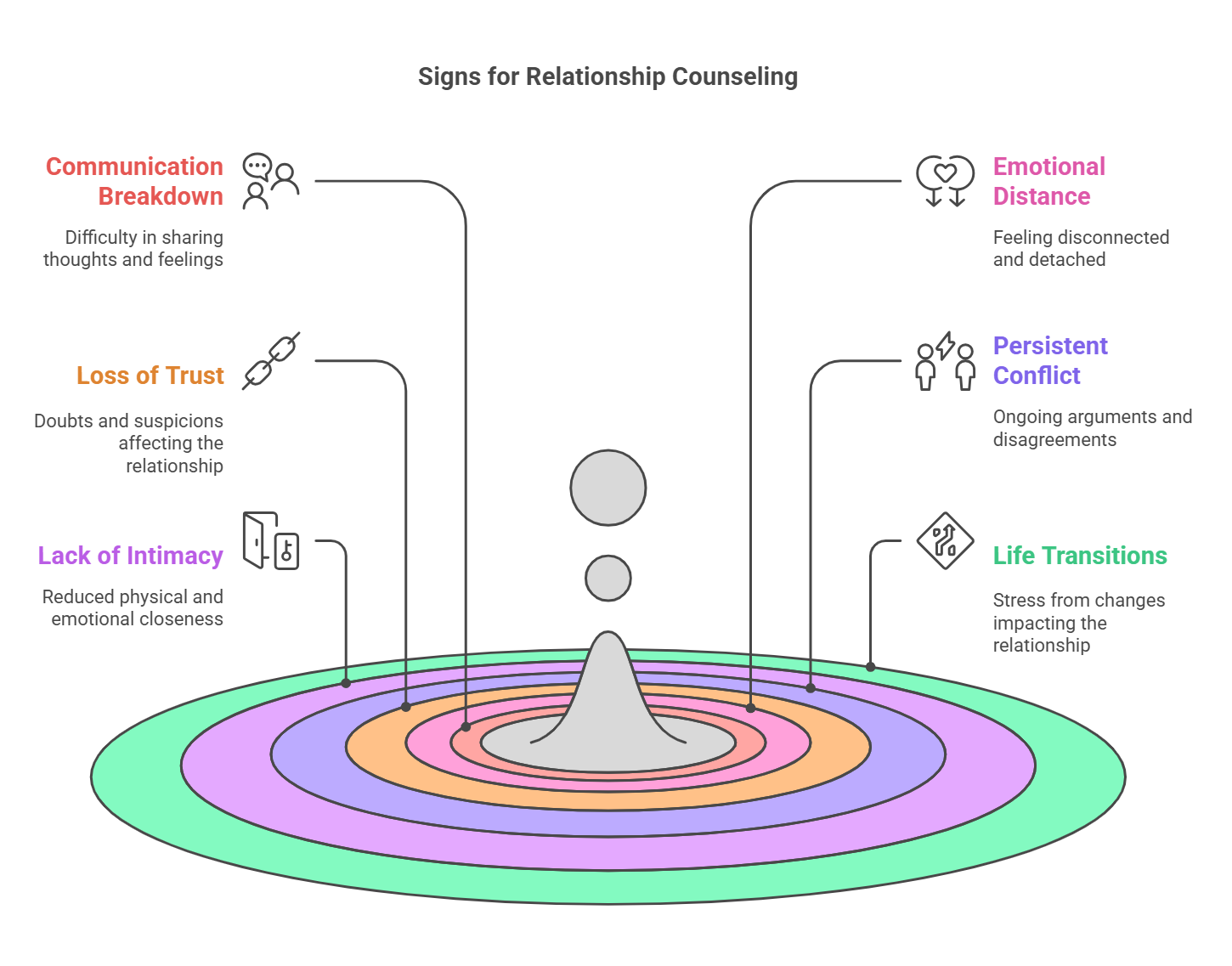When to Seek Help: 6 Signs Your Relationship Needs Counseling
Relationships are complex. Sometimes, despite our best efforts, we find ourselves needing a little extra help. When to seek help: Recognizing the signs that a relationship needs counseling isn't always clear. This post explores those sometimes subtle, sometimes glaring indicators that professional guidance might be beneficial.
When to seek help: Recognizing the signs that a relationship needs counseling can be a difficult first step. But taking that first step can make a world of difference. Let's explore some common signs.
Table of Contents:
When to Seek Help: Recognizing the Signs That a Relationship Needs Counseling
Communication Breakdown
Emotional Distance
Loss of Trust
Persistent Conflict
Lack of Intimacy
Life Transitions and Stressors
Considering Your Options When You Recognize The Need for Support
Conclusion
When to Seek Help: Recognizing the Signs That a Relationship Needs Counseling
Communication Breakdown
One of the most common signs is a breakdown in communication. This can manifest as constant arguing, avoiding difficult conversations, or simply not feeling heard. When you find yourselves constantly talking over each other or shutting down entirely, consider professional guidance. This communication breakdown is one of the clearest signs indicating when to seek help with textile designs.
Emotional Distance
Emotional distance can be a slow burn or a sudden shift. If you feel disconnected, unsupported, or lonely in your relationship, it's a sign something needs attention. Research indicates that a crucial component of marital satisfaction is affection, not necessarily sex, shown by holding hands or kissing (source). Physical intimacy includes holding hands, kissing, and even having deeper conversations which can build emotional bonds.
Loss of Trust
Trust is foundational. If trust has been broken through infidelity, dishonesty, or repeated betrayals, it can be incredibly difficult to rebuild on your own. Although most couples need counseling sooner rather than later, the average couple waits a whopping six years before finally getting the support they so desperately need. Research from The Gottman Institute further indicates this statistic. Unfortunately, this delay can lead to divorce.
Persistent Conflict
However, couples argue. However chronic, unresolved conflict creates a toxic environment. When arguments become the norm rather than the exception, external support and perspectives might offer some relief. Couples therapy tools give you the building blocks to break the cycle.
Lack of Intimacy
Intimacy involves both emotional and physical closeness. It warrants investigation if you notice changes in the frequency and quality of your physical connection and desire towards one another. For women, emotional intimacy and responsiveness in conversation with their partner often influence a relationship’s success and duration (source). Studies emphasize this.
Life Transitions and Stressors
Big life changes - a new baby, job loss, relocation - cause increased stress on a relationship. If these stressors magnify existing problems or create new points of tension, therapy could offer healthy coping mechanisms to deal with changes. Here's some wisdom from a renowned source on recognizing telltale signs when it’s the right time to seek professional help.
Considering Your Options When You Recognize The Need for Support
When considering couples counseling, online directories like Psychology Today and Good Therapy are useful resources.
You may feel the time to consider marriage counseling is long overdue. While you are trying to make the most of the life transitions and find a middle ground and ways to help you navigate challenges in life, couples counseling might be helpful to give a better foundation of trust within your romantic relationship so it thrives for a long time and offers healthy patterns.
For those near Calgary, the Calgary Women's Emergency Shelter is available for help. Relationship issues sometimes manifest as control issues or abusive patterns in life. When dealing with extreme problems like bipolar disorder, anger management issues, sex therapy, and/or couples dealing with infidelity it is important to get some counseling services or possibly other support groups as well for specific help you may need. You might even try seeing what advice John Gottman, an esteemed professional couples therapist who focuses on communication skills, and/or cyanosis in children, says on seeking more than just emotional support to resolve chronic underlying trust and physical intimacy issues as part of providing tools to middle-class people. Therapy helps couples recognize effective communication, build healthy patterns, and find common ground.
Conclusion
When to seek help: Recognizing the signs that a relationship needs counseling is a sign of strength, not weakness. It shows a commitment to improving your relationship. Although research shows impressive success rates, especially with Emotion Focused Therapy (EFT) sources don't hesitate to seek the proper support you might need. Some studies show the success rate is still about 70% and couples find this effective support. Finding a compatible therapist or finding help outside of what is provided for online therapy through different methods might provide a safer place for mental health assistance. Seeking professional help isn't a last resort. Consider counseling when to seek help.
If you reside in or around the St Petersburg/Tampa Florida area or Sarasota/Bradenton area, two options include scheduling an appointment with Cynthia McKay, JD, MA here or scheduling an appointment with Taylor Hall, LPC, MS here.
There is a wealth of research and tips online and in-person with groups available in a wide array of locations that provide tools to provide clarity in situations. For example, research from Purdue highlights John Gottman's 5:1 ratio in marriage counseling. Consider also using a well-established platform like Gottman Checkup as an option available online to facilitate growth within the marriage through couple assessments.



